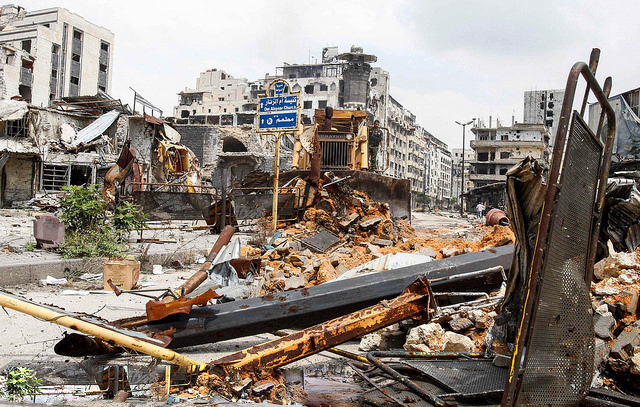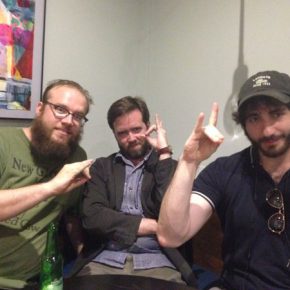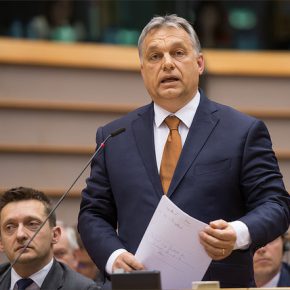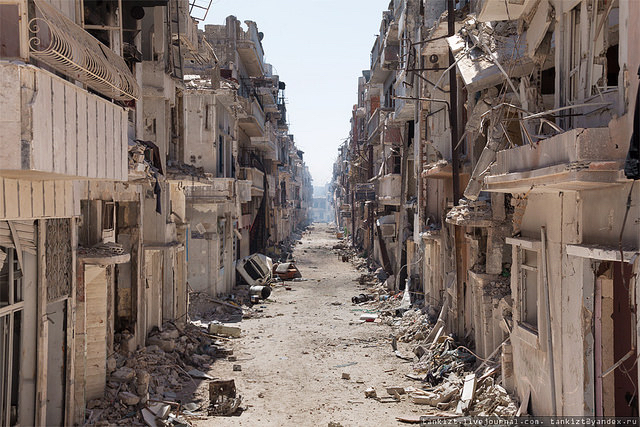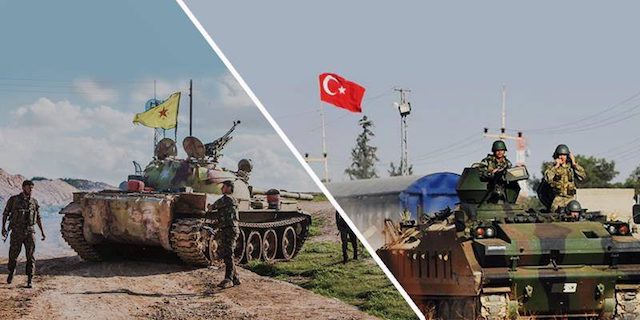Damascus-based communication coordinator, Pawel Krzysiek, discusses the factors contributing to the unprecedented toll of urban warfare on Syria’s civilians, and what the warring parties and their supporters must do to save lives.
BEIRUT – The nature of modern warfare and the polarization of information in Syria have contributed to the unprecedented civilian toll of urban warfare, according to Pawel Krzysiek, the communication coordinator for the International Committee of the Red Cross (ICRC) in Damascus.
Five times more civilians have been killed in cities than in rural areas in Syria and Iraq over the past three years, according to the ICRC’s new report I Saw My City Die.
Civilians in Syria are paying an even higher price now that the offensives against the so-called Islamic State group are underway in Raqqa and Deir Ezzor, making it even more vital that “fighting parties, and their supporters, think about how they conduct the war because the victory by all means is not really a victory,” Krzysiek said.
To “reduce the cost” of urban warfare for civilians, according to the ICRC, warring sides and “states supporting parties to armed conflict” must stop besieging populations, using explosive weapons and targeting water, electricity, sanitation, health and humanitarian facilities and personnel – violations of International Humanitarian Law (IHL) that occur quite frequently in Syria.
Syria Deeply spoke with Krzysiek about how biased or lacking information impacts civilians in urban warfare and the importance of raising awareness of International Humanitarian Law in a conflict where so many parties have been accused of violations.
Syria Deeply: Cities are typically information hubs for communities, but in Syria, much of the vast amount of information gets manipulated, leading to rumors or widespread belief of disinformation. How has this factored into the civilian toll of urban warfare?
Pawel Krzysiek: Information plays a key role in each conflict. It can actually help people – information on where the nearest camp or water well is – but it can also be used as a tool of war. Today in Syria, the war is not only happening on the ground, but also very much on social media. We’re seeing a very polarized media and social media environment.
How do you find accurate information? How do you read through the multitude of information – because it’s also about the amount – and how do you verify it?
What we’ve seen in Syria is that most information is extremely difficult to verify, and journalists’ lack of access further complicates this: It is extremely difficult to verify information from a source that you cannot meet.
Being trapped by information makes it even more difficult to help people. Today, influence on humanitarian actors or organizations does not only come from political pressure or funding, it can also come from media, using information from inside Syria, which is not always accurate.
It’s extremely complex to work in Syria. Multiple groups, fluid front lines, difficulties of access, makes humanitarian operations very complicated. We need to talk, in the most objective way, about what is happening on all sides of the conflict, but today, the media and information has become an open part of the hostilities.
Syria Deeply: We saw this in eastern Aleppo. When residents heard there would be a humanitarian corridor – after having lived under siege and aerial bombardments for four years – they had very limited options for trustworthy information or a guarantee that it would be okay.
Krzysiek: Absolutely. This is the problem. In times of conflict, people rely on information for hope or survival. If this information is false or inaccurate, people are exposed to risks. This is why the ICRC is working on the concept of information as aid: How do we use modern tools, such as Facebook or Twitter, to give people life saving information about available services?
[During the 2015 Aleppo water crisis] we created a GPS-enabled map of repaired water wells and released it on Facebook so people could geo-locate themselves to the nearest pump. But without meaningful outreach to the community relying on this information, it could never be their primary source.
Syria Deeply: Have you found that the absence of reliable information distracts from important issues by limiting the conversation, for example, to the accuracy of numbers?
Krzysiek: I think numbers are dehumanizing the Syrian conflict. Instead of looking at the numbers, the ICRC is trying to dig deeper into human stories. Behind this number there is a human life. Behind it, there is always a story, usually a story of suffering or struggle, but often also of hope and resilience that shouldn’t be disregarded or flattened into a number.
Once, I was asked, “Can you confirm that thousands of people are starving?” My answer is clear: even if there is one person hungry, it’s enough reason to respond.
Syria Deeply: The civilian toll of urban warfare is now unprecedented (and last seen as such scale during Word War II). Is there a change in modern warfare, or a specific perpetrator that has set this precedent?
Krzysiek: War has changed since the Geneva Conventions were established and, today, it’s even more challenging to engage in a meaningful dialogue over International Humanitarian Law (IHL).
IHL is the minimum standard and definition of acceptable behavior, anything below is unacceptable. IHL is not only about the law, it’s about ethical standards and the basic rules of humanity that can save millions of people. Enforcing and respecting this law is the responsibility of the parties to the conflict, of the fighters. This makes it very difficult.
Over a long period, wars have moved from very clear, open battlefields to asymmetrical frontline operations where it’s very difficult to say who is who, who is fighting where, or to distinguish between military and civilian positions. Next to a military target in a densely populated area, there will always be a school, a civilian building or a hospital.
This is why it remains vital to discuss IHL, even if, in many occasions, it is not respected. We will push harder to raise awareness, even if it does not always result in a change. We will continue to insist on a dialogue about these standards, even, and especially, when military priorities dictate the agenda. This is all we can do.
Syria Deeply: Violations of IHL violations are dangerously common in Syria. What will it take to change this dangerous precedent already set in Syrian cities?
Krzysiek: The rules remain largely adequate and human suffering is never normal. People fleeing, people dying, people not having access to medicine should never be considered normal.
I think there is this standardization. There is a fatigue because of how protracted many conflicts today become. However, even if they are protracted and they last seven years, 10 years, 15, it’s never normal.
Everyone sees all the possible violations every day in the region. But the ICRC tries to look for solutions, even if they are not realistic or far from being implemented. We don’t focus on [the violation] itself but on how to address it so it won’t happen again.
We never question the rationale or reasons behind the wars. But we do question how these wars are conducted, how parties achieve their objectives and the implications on civilians. That is the most important thing.
https://www.youtube.com/watch?v=iTk08h_d74E
Syria Deeply: How does this apply to conflicts that include non-state actors, who are not committed to IHL?
Krzysiek: In the ICRC’s over-150-year history, we have seen non-state actors with whom we could engage over IHL, its principles and the conduct of hostilities. At the same time, we do recognize it will always be a challenge for us.
As the ICRC, we do engage in confidential dialogue with the parties but the pressure should also come from elsewhere.
Syria Deeply: Even in Raqqa and Deir Ezzor?
Krzysiek: These are places where we face problems and cannot have regular operations.
The ICRC should not be the only one talking to all sides of the conflict about life-saving IHL provisions and how to convince armed actors to comply. It’s the responsibility of all of us: the international community, media, social media influencers, actors with leverage on the ground.
Life-saving provisions include the distinction between military and civilian objects, proportionality- the harm inflicted on civilians cannot outweigh the military value of an attack- and the rule of precaution, which requires parties to ensure these standards are met before an attack, and to stop if they cannot. In Raqqa, and many other places in Syria, civilians are already paying the price for the absence of these provisions.
The question is, should we give up? We have to keep trying. It might not happen now, and it might not happen tomorrow, but it’s our responsibility to raise awareness about policies, solutions and programming that must be applied once the guns go silent.
Even if the conflict in Syria finishes tomorrow, we will be dealing with the humanitarian consequences for decades, so we are not done yet, and we will not be done for a long time.
This article originally appeared on Syria Deeply, and you can find the original here. For important news about the war in Syria, you can sign up to the Syria Deeply email list. Photograph courtesy of the Freedom House. Published under a Creative Commons license.
